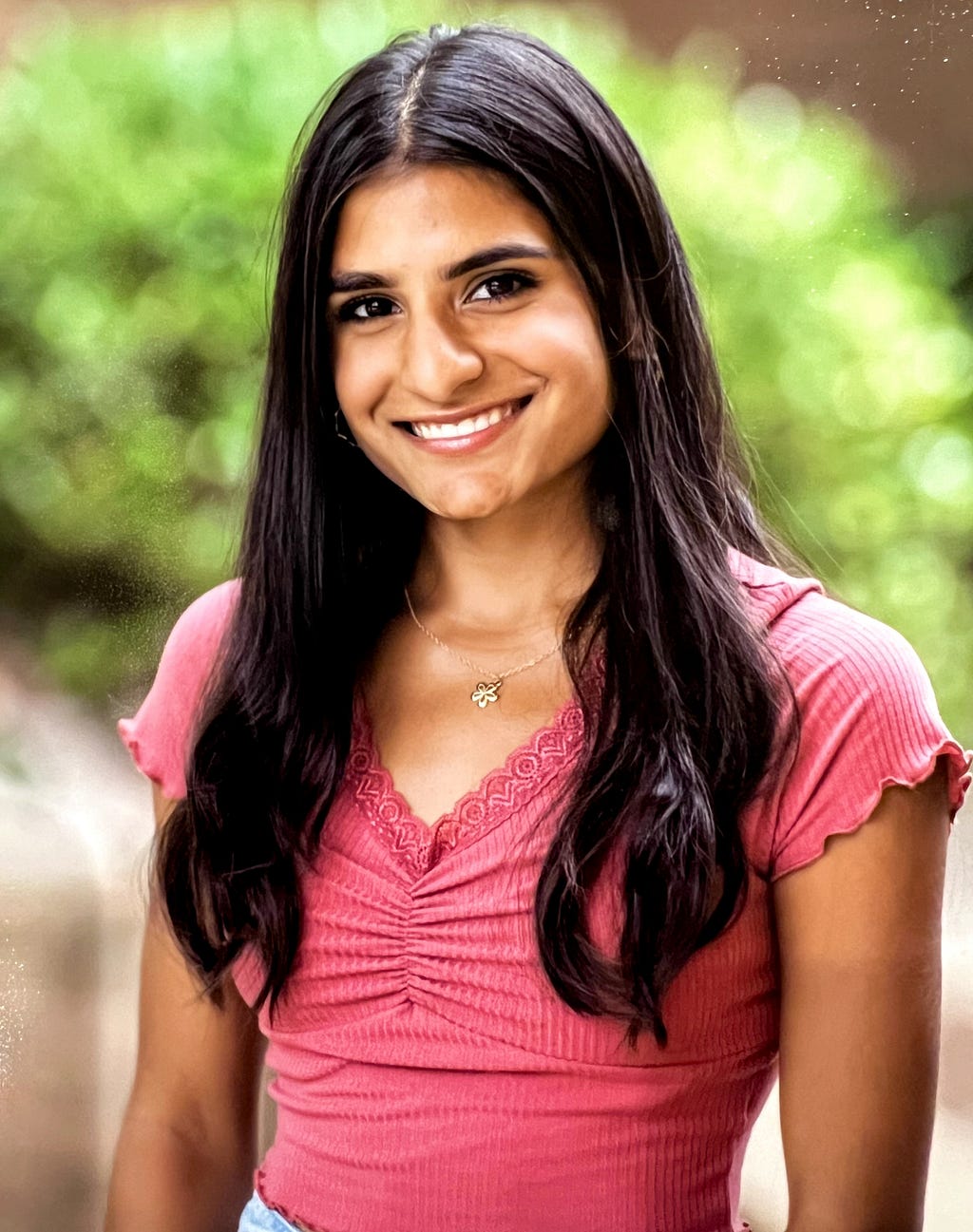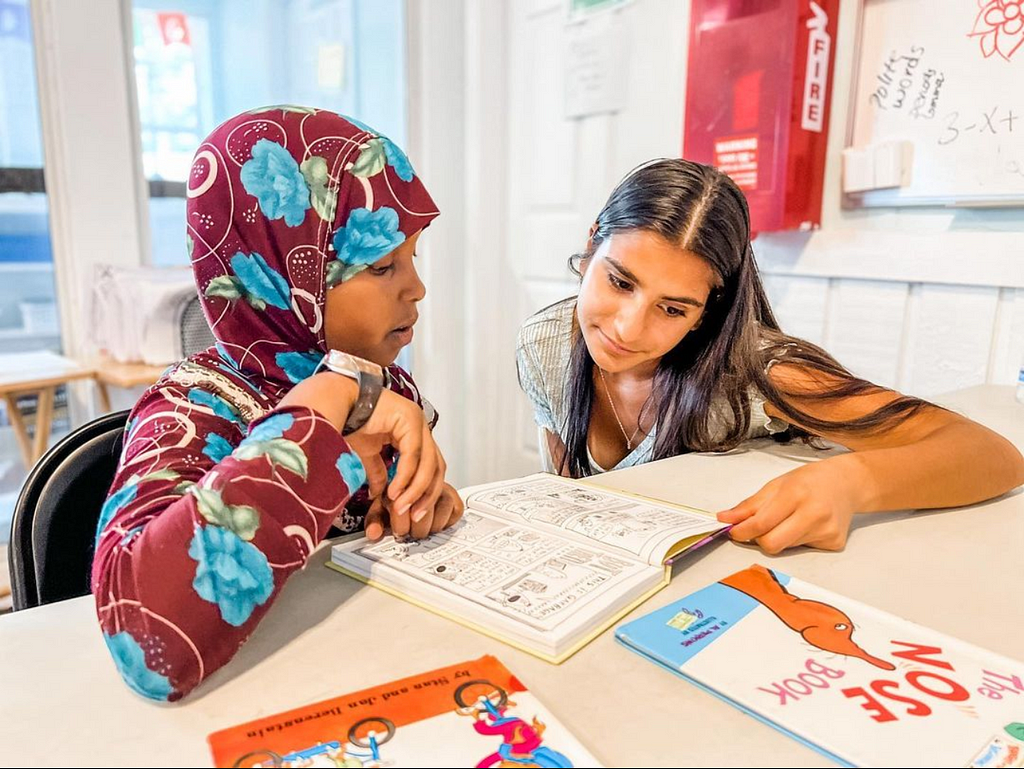Young Social Impact Heroes: Why and How Tanya Sachdev of Empowering Refugee Children Is Helping To Change Our World

…there are many ways to help out, but taking that first step is always the most important. I cannot pretend to know all the ways and would encourage interested individuals to contact local refugee resettlement agencies about hands-on ways to help out.
As part of my series about young people who are making an important social impact”, I had the pleasure of interviewing Tanya Sachdev.
Tanya Sachdev is the 17-year-old CEO of Empowering Refugee Children (ERC), a 501(c)(3) nonprofit organization. She founded ERC with the goal to improve educational accessibility for refugees. ERC’s scholarship program awards $1000 scholarships to help provide financial support for the refugee youth community. Through support from sponsors and donors, ERC has raised over $2000 and has ended its first scholarship cycle with applicants from different parts of the US. ERC has been awarded the Spark Jr. Award from the Better Business Bureau of NC for its work to help local refugees.
Thank you so much for doing this with us! Before we dig in, our readers would like to get to know you a bit. Can you tell us a bit about how you grew up?
Of course. I grew up in Canada as the daughter of immigrant parents meaning my days were a mixture of India and Canada. Taco Tuesdays and Taylor Swift delightfully blended with paranthas and Bollywood music to shape who I am. My older brother always had an ice hockey stick in his hand, always assigning me the role of goalie during our daily hockey scrimmages. Alongside my passion for sports, education was always at the forefront of my childhood. My immigrant parents taught me that education was equivalent to possibility. My dad entered Canada with a degree and a dream, building his life from the ground up, always sharing that education stays forever. Down the road, the firm belief in education was ultimately a strong catalyst towards starting Empowering Refugee Children (ERC), my nonprofit dedicated to helping improve educational accessibility for refugees.
You are currently leading an organization that aims to make a social impact. Can you tell us a bit about what you and your organization are trying to change in our world today?
Yes, of course. Nelson Mandela famously stated, “Education is the most powerful weapon which you could use to change the world”. As I mentioned briefly, ERC works towards improving educational accessibility for refugees. ERC focuses on providing youth refugees with a platform to pursue educational opportunities through our scholarship program while working to amplify the voices of refugee youth.
Empowering Refugee Children (ERC) was named in order to reflect our organization’s mission and values. To empower means to make someone stronger and more confident to claim their rights and control their life. Our name also highlights the importance of focusing on the needs of children and youth who have been affected by forced displacement. Half of the world’s refugees are children, making them among the most vulnerable populations when it comes to forced displacement (UNHCR). In fact, only 3% of refugees have the opportunity to pursue secondary education (UNHCR). ERC’s goal is to empower young refugees by providing them with the tools and resources they need to succeed. We believe that education is key to unlocking opportunities and breaking the cycle of poverty and displacement that many refugees face. We believe that by empowering refugee children, we can help to build a better future for them and for their communities.
Can you tell us the backstory about what inspired you to originally feel passionate about this cause?
Certainly, an NPR radio discussion on the Afghan Refugee Crisis on my way to school in August of 2021 was actually the catalyst. The news made me realize my limited knowledge of the refugee community both globally and within my own community. After researching, I started a STAR (Students Together Assisting Refugees) club branch at my school with the goals to help raise awareness about the Global Refugee Crisis and work with local refugee organizations. Having awareness at the forefront of STAR’s mission led to organizing events with a platform for local refugees to share their stories. Learning from their journeys inspired me to be an active volunteer within local refugee organizations such as Refugee Hope Partners and CWS Durham.
Many of us have ideas, dreams, and passions, but never manifest it. They don’t get up and just do it. But you did. Was there an “Aha Moment” that made you decide that you were actually going to step up and do it? What was that final trigger?
Wow, that’s a great question. Initially, the realization about improving educational accessibility came from one of the students that I was tutoring. As a senior in high school, she really wanted to pursue a four-year degree in history, but due to her family’s financial obligations, she was unable to. As I learned more about how more than half of refugee children do not get a proper education (UNHCR), I wanted to do something. ERC became more than just a scholarship program, but a platform to share local refugees stories and amplify their voices. I know that ERC’s scholarships are just a drop in the bucket, but every drop counts. Working with local refugee organizations, ERC hopes to make a meaningful impact on the lives of refugees.
Many young people don’t know the steps to take to start a new organization. But you did. What are some of the things or steps you took to get your project started?
The first step after identifying a need is defining the mission and vision. Many times, there are organizations that already have programs in place that are working toward the problem you have identified. With ERC, I was fortunate to be able to work with the support of current programs and local refugee organizations to encourage applications and create our scholarship program. After defining the mission and vision, the next step will differ based on your organization. The most important advice I received was to make sure “you got to sleep excited about your organization and wake up excited to continue following your passion”. The biggest step is to ensure you are passionate because if so, you will forge your unique path.
Can you share the most interesting story that happened to you since you began leading your company or organization?
Each journey has ups and downs. At a moment when I wasn’t sure whether ERC was even making a difference, I was able to speak with an individual who currently works for a refugee resettlement agency. She was moved by the mission of ERC. As a former refugee, she told me why she had a strong passion for education for refugee youth and was proud of this initiative. I may not be able to see the measure of ERC’s impact, but during low moments, I circle back to that conversation and am inspired to continue working towards the goals of ERC. As I walked up on stage when ERC won the BBB Sparks Jr. Award for an organization with a high level of character and authenticity, I realized the impact a singular person had on me. This experience reminds me of every person’s support and belief in the mission contributing to the impact of ERC.
It has been said that our mistakes can be our greatest teachers. Can you share a story about the funniest mistake you made when you were first starting? Can you tell us what lesson you learned from that?
Definitely! When I had initially created the website for Empowering Refugee Children, I had worked to ensure the font size, color scheme, and pictures all lined up. Overcome with excitement, I published the website without realizing that the website’s URL was the same as my nickname.
After the first initial shares of the website, I realized my mistake and quickly changed the website URL to match Empowering Refugee Children. I crossed my fingers that no one had noticed my embarassing blunder. I was expecting to receive criticism, but the few individuals who had viewed the website just responded amused by my error.
This experience taught me the importance of dotting my i’s and crossing my t’s, but also how to react to mistakes. At that moment, I was incredibly embarrassed, fearing that my juvenile mistake would diminish the credibility of my organization. After all, I was letting my age and experience show. Fortunately, this experience taught me that mistakes will happen but we have the power to fix our mistakes. It also reminded me not to take myself too seriously and to embrace the mishaps that come with building something new.
None of us can be successful without some help along the way. Did you have mentors or cheerleaders who helped you to succeed? Can you tell us a story about their influence?
My biggest cheerleader is definitely my older brother. Ever since I was young, I grew up as his actual cheerleader, bringing my biggest hand-drawn poster and loudest cheering voice to his ice hockey tournaments from New York to Florida.
Convincing my parents and other fans to follow suit in my cheers at the age of five, it was a well-known fact that I would always go the extra mile when watching his games. My brother inspired me to go the extra mile for myself and my dreams. The roles reversed and he became my cheerleader, constantly encouraging me to follow my passion and never stop believing in myself.
When watching his games, my five-year-old self would always close my eyes during shootouts, not wanting to watch his team fail. My fear of failure was one of the biggest obstacles in starting Empowering Refugee Children. My brother reminded me that the game continued whether I closed my eyes or not. His words reminded me that failure was not the end, but merely a part of the journey.
While I still continue my ritual of shutting my eyes while cheering for my favorite sport teams,, I have become better at understanding the importance of failure. My brother taught me to embrace setbacks, learn from them, and keep moving forward with resilience and determination.
Can you tell us a story about a particular individual who was impacted or helped by your cause?
Of course, but before I begin, I will like to share a little bit about the ERC application process. ERC offers the option choosing of three open-ended prompts for our application ranging from writing about future goals to challenges to anything they are passionate about. ERC focuses on these open-ended prompts as a way to learn stories and amplify the voices of refugee youth.
I had the privilege of reading through stories of individuals impacted by war but wanting to pursue education in law or others who are passionate about reading. Through providing scholarships ranging from $500-$5,000, ERC has specific ways that particular individuals are impacted by our organization. More important than the tangible impact is the intangible. One of the most rewarding moments was being approached by a member of a local refugee organization who thanked ERC for specifically focusing on education and sharing the impact that the cause had.
Are there three things the community/society/politicians can do to help you address the root of the problem you are trying to solve?
Yes! Thank you for asking this. At the root of the problem involving educational accessibility for refugees is in policy and legal frameworks. Countries have the responsibility for including refugees in national education systems and working towards inclusive policies and funding to ensure that refugee students are not excluded from schooling.
As individuals, we can help address the problem through awareness, advocacy, and action. The Global Refugee Crisis impacts 1% of the world’s population with over 100 million forcibly displaced people (UNHCR). The more people who are aware of the problems faced by refugees, the greater likelihood towards the possibility of change. The next step of advocacy involves writing to legislatures in support of bills that will help refugees. One of the organizations that I volunteer with CWS Durham has a whole platform for Action Alerts, which is a great place to start the advocacy journey. Finally, take action. Many refugee organizations have volunteer opportunities ranging from English language instruction to furnishing homes. Volunteering is a great way to get involved with the refugee community and began providing first-hand assistance through language and mentorship programs. Creating an inclusive and welcoming environment for refugees plays a big role in improving educational accessibility. Similarly, donating to credible organizations that help refugees is another way to take action.
Of course, there are many ways to help out, but taking that first step is always the most important. I cannot pretend to know all the ways and would encourage interested individuals to contact local refugee resettlement agencies about hands-on ways to help out.

What are your “5 things I wish someone told me when I first started” and why? Please share a story or example for each.
- Patience
- It’s Okay to Fail- Not Getting What You Want is a Stroke of Good Luck
- Visuals matter!
- Build authentic relationships/connections
- Enjoy the Journey
If you could tell other young people one thing about why they should consider making a positive impact on our environment or society, like you, what would you tell them?
Go for it! Know that anything is possible and that every positive impact matters!
Initially, I wasn’t sure how a single scholarship could help anyone, but though small, I have gotten to first-hand see the impact. Any positive impact, no matter how small, is still an impact. One of my favorite quotes, actually the home screen of my computer, is “In the end, you only regret the chances you don’t take”. Follow your passions and go for it!
Is there a person in the world, or in the US with whom you would like to have a private breakfast or lunch, and why? He or she might just see this, especially if we tag them. 🙂
Wow, what a great question! For me, there are two people that I would love to meet over lunch. One of them I learned about through listening to UNHCR’s “Forced to Flee” Podcast; Mary Maker is a refugee from South Sudanese who is passionate about refugee education. I remember being so moved when I heard her episode and went home to learn more. From there, I listened to her Ted Talk about the importance of education for girls and became an even bigger fan! The second person is Yusra Mardini who is an Olympian which is incredible! As a passionate field hockey and track athlete, I was instantly drawn to the Netflix film “Swimmers” which is based on her life. She is a Syrian refugee who went on to the Rio Olympic Games which is so amazing! I would love to chat with her about her sport and learn from her!
How can our readers follow you online?
They can follow ERC through our Instagram @empoweringrefugeechildren or our website https://www.empoweringrefugeechildren.org/ for updates!
This was very meaningful, thank you so much. We wish you only continued success in your great work!
Photo Credit: @RefugeeHopePartners
Young Social Impact Heroes: Why and How Tanya Sachdev of Empowering Refugee Children Is Helping To… was originally published in Authority Magazine on Medium, where people are continuing the conversation by highlighting and responding to this story.
